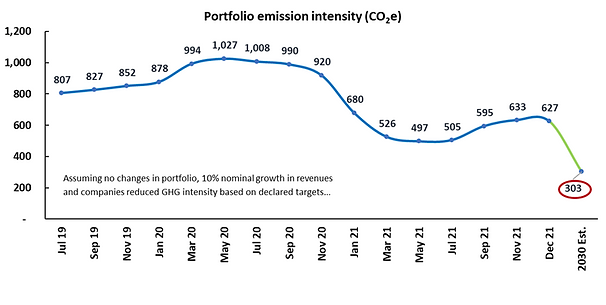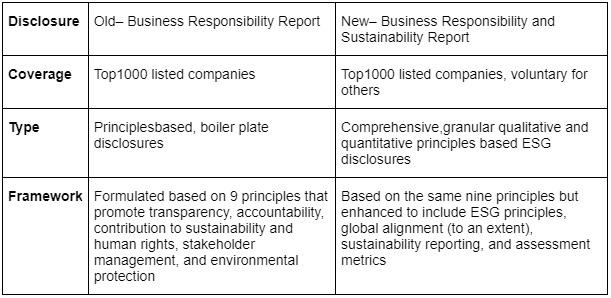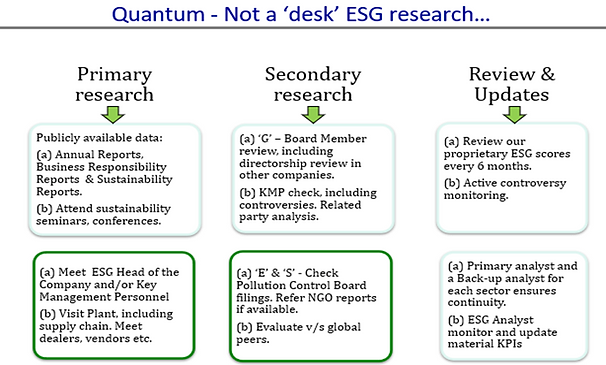With pressures to make ESG reporting more meaningful, we take a look at the standards, quality and coverage to come, globally and in India.
There are two areas where real momentum building up, one is the obvious area of Sustainable Investing and other is the Indian economy. As highlighted in our macro note, our on ground assessment suggests that "For the first time in more than 5 years, we are getting positive about the prospects of the Indian economy”. Equally, the Indian economy and Sustainable Investing have been receiving huge flows as momentum gathers pace. India was also a key beneficiary of global flows. In fact, the VC investment boom in India was the biggest stand-out. Total PE/VC investments in India in 2021 is estimated at ~75 billion of which VC was ~USD 35 billion. These are large flows which have essentially gone into building new Indian businesses, brands and markets. This bodes well for India's economic recovery.
In Sustainable Investing, a record $649 billion poured into ESG-focused funds worldwide through Nov. 30, up from the $542 billion and $285 billion that flowed into these funds in 2020 and 2019, respectively, the latest Refinitiv Lipper data shows. ESG funds now account for 10% of worldwide fund assets. There's an all-hands approach driving this trust in sustainable investing; Policymakers are raising the bar and driving transparency, corporates are responding to consumer trends and asset managers are engaging and acting to drive outcomes.
ESG has dominated corporate discourse in 2021 and this is set to continue as we move into the new year. Environmental, social and governance concerns have risen rapidly to the top of the corporate agenda, accelerated by such movements as “#MeToo” and the much-hyped COP26 conference that delivered a slew of net-zero pledges. The “S” of ESG is also increasingly becoming more important as an investment criterion. Issues like biodiversity, carbon offsetting, and sustainable supply chains are the next focus areas of ESG integration. Investors will continue to shine ever-brighter lights on issues of provenance and are embracing organizations that demonstrate and invest in sustainable, ethical approaches more than ever before.
Going forward, the priorities and themes that investors would focus on include a realistic net-zero road map implementation, Greenwashing concerns drive transparency in ESG profiling, the journey of ESG data comparability and coverage to facilitate decision making, Emphasis on 'S' with a particular focus on cybersecurity and outcome-based corporate engagement.
Given the evolving ESG trends, we have always emphasized on best practices globally and hence have found ourselves ahead of the curve. We recognize that there is always scope for improvement, but we want to make ourselves ready for the emerging trends and are also trying to ensure that we contribute towards the development of the sustainable eco system around us. A few examples to highlight our practices and contributions are: Given the rush of tall emission reduction promises, we only relied on such pledges if the same were presented with a credible plan like the science-based targets initiative alignment. We also have been advocates for better disclosures from companies and were invited to be part of a government-led task force to contribute towards furthering sustainable finance in India and lead the disclosure subgroup of the task force to strengthen ESG disclosures in India. Our ESG research does focus on the 'Social' dimension as much and us being a WDI signatory helps us learn the evolving best practices and engage with companies on such matters. We have always engaged with companies to understand their ESG practices and nudge them to become better corporate citizens.
2022 - Looking Through Our ESG Lens
In 2022, levels of carbon dioxide emissions in the atmosphere are expected to reach a dangerous milestone: a 50% increase compared to pre-industrial levels. At the same time, ecosystems are now losing species at rates not seen since previous mass extinction events. On a global scale, these changes pose material risks for companies and investors in terms of disrupted supply chains, lower crop yields, and greater food price volatility. Investors should thus seek out companies that are able to manage these risks, as they are likely to outperform in the long term.
The pandemic may have pushed sustainable investment into the mainstream, it is still a work in progress. For investors, a lack of standardization makes comparisons difficult, while measurement and reporting remain heavily focused on the 'e' (environment), rather than 's' (social) or 'g' (governance). Could that change in 2022?
Let's look at some interesting ESG trends for 2022 and what are we doing about them.
Net Zero Commitments Need a Credible Plan
The Institutional Investors Group on Climate Change (IIGCC) with 370 members representing $50 trillion of assets also advocates a decarbonization journey, through which portfolio-level carbon footprints must be 50% lower by 2030 and net-zero by 2050.
Companies around the globe are facing pressure from stakeholders to not only set net-zero targets for carbon emissions but to demonstrate their progress towards meeting these targets. One solution that many companies have started to implement is carbon offsetting or the process of compensating for CO2 emissions by participating in schemes designed to make equivalent CO2 reductions from the atmosphere. Nonetheless, the benefits of carbon offsetting are indeed questionable as companies cannot plant their way out of climate change. There is a need to bring a meaningful emission reduction plan on the table.
We believe QIRR portfolio is geared to meet the more real reduction in emissions intensity by 50% by 2030 as compared to prevailing levels today. Importantly, the companies are not relying on carbon offsetting, but most have credible plans to reduce emissions aligned to the science-based targets.
QIRRS - Portfolio Emission Intensity to Halve by 2030

Source: Quantum Asset Management Company Pvt Ltd.
Notes to GHG Emission charts:
GHG intensity reported in this section is based on the data sourced from the sustainability / annual reports of Portfolio companies. While the Firm intends to report complete GHG emissions of portfolio companies, certain companies report their GHG emissions as 'metric tonnes of 'CO2' rather than 'metric tonnes of CO2e' (i.e GHG). Consequently, the data reported by the Firm is subject to such constraints or limitation on sourcing complete data.
This section on GHG intensity of Quantum India ESG Equity Fund is being provided since April 2021 month newsletter (to disclose GHG Emission data of the said portfolio). From April to July 2021, the newsletters used the terminology 'carbon intensity' instead of 'GHG intensity' as both of these terms are generally used interchangeably in practice. The GHG emission data that was disclosed however included data of other non-carbon GHG gases such as CH4, N2O, etc. (where available based on the data provided by the portfolio companies - refer paragraph above). Effective August 2021 month's newsletter, the term 'carbon intensity' has been replaced with 'GHG intensity' for better clarity. Accordingly, the terminology used in the legends for the relevant graphs has been changed from 'CO2' to 'CO2e'.
Portfolio GHG* Emission - Companies contributing ~95% of total emissions have committed to reduce intensity

ESG Reporting in India to Improve Substantially From FY23
A recent report from Morningstar showed that there were at least 34 regulatory bodies and standard setters across 12 markets undertaking official consultations on ESG in 2021 alone, adding “it's no wonder that companies' and investors' heads are spinning”. Although, each one seems to be learning from others' practices but most of them still working in isolation. It will only be beneficial if regulators, standard setters work in close coordination to emerge a common reporting framework to this global shared agenda. This would make it far easier for the companies that need to conform to these standards, many of whom are operating across international borders anyway.
Going forward, focus will be on granular ESG data in financial reporting. Regulators have responded to the new pressure by making ESG disclosures a priority. Hopefully, it would be the year where global financial regulators and voluntary standard frameworks converge around concrete measures to improve data standardization, quality, and coverage.
India disclosure framework - Better disclosures ahead but look beyond the 'glossy' reports!

Although the new BRSR is a significantly enhanced form of BRR, the government does not want to be behind the curve and has therefore established a task force to look at enhancing disclosures. Quantum advisors and its subsidiary have been part of a government-led task force that's working towards improving sustainable finance in India. Apart from contributing to various facets like Taxonomy, regulations, etc, we are leading the disclosure vertical to see how corporate reporting on ESG can be enhanced and disclosure on investment products alike to ensure they are true to label.
Scrutiny over 'greenwashing' will ramp up
Although companies are broadly seen progressing well on the sustainability bandwagon, but some companies have started to talk a good game whilst continuing to engage in activities that cause environmental harm. Stakeholders are vary of the Eyewash, hogwash, and Greenwash (EHG) practices in the promising ESG journey and expect to pressurize companies to translate their talk into meaningful action. Investors are increasingly seen flexing their muscle to challenge companies' ESG credentials. Regulators are also beginning to tighten the screw by enforcing mandatory disclosures that force companies to move beyond 'Green' marketing & PR to meaningful action.
Governance approach to navigate the corporate spin
“Greenwashing” at the end of the day is a matter of ethics; it is a spin of corporate social responsibility in declaring itself as an environmentally friendly company whereas, in reality, the company may not live up to its commitment. Hence, it boils down to “Corporate Governance”. It effectively means assessing the credibility of the Board and the management of the company and analysing the decisions. How these decisions have impacted different stakeholders gives evidence of the principles they stand for and the value systems they follow. Our experience through the integrity screen built since 1996 to evaluate companies on governance and the thrust on governance in the ESG framework helps evaluate the management quality and avoid bad actors.

QIRRS - Not a “tick the box” desk ESG research
Quantum believes that verification of ESG credentials still warrants a detective lens, and one cannot and must not rely on self-disclosures. Information can also be obtained from many unconventional sources like NGOs, local communities, regional/regulatory boards.
We aim to meet sustainability officers or key management personnel to understand the ESG strategy of a company and seek answers to our queries. Many companies create the impression that they are doing the right thing for sustainability, but then fail to produce relevant and tangible information about the action they are taking.
Further, we visit plants - including that of supply chains - to get a first-hand verification of the tall claims. Furthermore, a 360-degree check by interacting with dealers, vendors, employees, customers, and regulators does go a long way in identifying any inflated or absurd claims made by the company.
The digital conundrum
While the speed of the recent digital transformation to enable business continuity, remote working, and automation is likely to continue in 2022, digital security has become a high priority as many companies take on the digital-first approach to stay relevant alongside changing consumer trends.
However, cybercrime is predicted to inflict damages of USD 6 trn globally in 2021 from lost productivity, damage and destruction of personal and financial data, and theft of intellectual property. With reputational harm and ransomware attacks becoming more prolific and expensive, damages are forecast to reach USD 10.5 trn in 2025. Breaches and recent ransomware attacks in diverse sectors have highlighted the risk of poorly secured infrastructure.
Cyber vulnerabilities are an existential business risk that investors should not ignore, and it is managed within ESG as part of the “S” dimension. Leading companies in this area know that cybersecurity is an emerging risk and are building cybersecurity into their business products, services, and processes. The best-performing companies have already increased their focus on cyber-risk management, skills and infrastructure throughout the organization including supply chains. Awareness is growing and spending on cyber resiliency will continue into 2022 given the risks that firms must manage in this area.
Investors should consider a company's cybersecurity preparedness as a part of their investment decision, as companies that can manage these risks are more likely to avoid negative surprises. We at Quantum have built a proprietary cyber security assessment of companies which we believe gives our ESG process an edge and be vary of companies that are not prepared for the eventualities.
Active engagement - Quantum Team has a 30-year track record of engagement with India Inc.!
The easy way to get rid of a carbon problem in an individual portfolio is to sell the polluting stock and move on. However, there is a growing realization that this simply moves the problem elsewhere rather than bringing net zero a step closer. This should be a powerful catalyst to change corporate behaviour in the year ahead. ESG advocates active ownership which drives investors away from activism and divestment actions towards more constructive engagement. This is an opportunity for companies to tell their story, show their willingness, and align investors to their sustainability agenda.
We believe engagement is that feedback loop that keeps the ESG momentum going. The notion that successful engagements lead to meaningfully improved financial and share-price performance, alongside better governance is fast gaining traction. For long-term investors, it is becoming an important pillar of their stewardship agenda.
Quantum's multi-faceted engagement approach intends to focus on these areas:
- Our proprietary ESG scoring provides good insights on areas where companies lag on material ESG areas of their operations. This provides us an opportunity to directly provide ready feedback for the company to focus on, a simple letter to the management or the Board is a good starting point.
- Comply or explain - Meet company management/sustainability team to understand their approach and targets.
- Escalate issues to the board level where necessary.
- Guide companies on best practices/benchmarks that help them shape their sustainability agenda.
- Engage with multiple stakeholders like employees, suppliers, customers, NGOs, etc to get more information and verify the tall claims made by the company.
- Continue to exercise proxy voting judiciously.
- Take portfolio action as may be necessary.
2022 - the Year of Action
Sustainable investing is moving from just being lip service to real action. 2022 will be the year where ESG aspirations meet implementation. With our holistic ESG approach, we provide investors with an opportunity to invest in companies that operate sustainably. The investments channelized to these companies are further encouraging them to improve. It also inspires companies on the other end of the spectrum to seriously consider treading this path as they compete for capital.
We are conscious of the fact that the self-certification, rubber-stamping environment can result in quick mandates and quick wins. That is not our objective and we have shunned the pay-a-fee and get-a-stamp model. We will make errors of judgment, a misstep, or a stumble as we navigate the new terrain but navigate and trudge on, we will. With good intent, we would expect a good outcome.
















